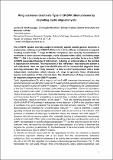Ring nucleases deactivate Type III CRISPR ribonucleases by degrading cyclic oligoadenylate
Date
11/10/2018Author
Grant ID
BB/M021017/1
BB/M000400/1
WM140004
Keywords
Metadata
Show full item recordAbstract
The CRISPR system provides adaptive immunity against mobile genetic elements in prokaryotes, using small CRISPR RNAs that direct effector complexes to degrade invading nucleic acids1,2,3. Type III effector complexes were recently demonstrated to synthesize a novel second messenger, cyclic oligoadenylate, on binding target RNA4,5. Cyclic oligoadenylate, in turn, binds to and activates ribonucleases and other factors—via a CRISPR-associated Rossman-fold domain—and thereby induces in the cell an antiviral state that is important for immunity. The mechanism of the ‘off-switch’ that resets the system is not understood. Here we identify the nuclease that degrades these cyclic oligoadenylate ring molecules. This ‘ring nuclease’ is itself a protein of the CRISPR-associated Rossman-fold family, and has a metal-independent mechanism that cleaves cyclic tetraadenylate rings to generate linear diadenylate species and switches off the antiviral state. The identification of ring nucleases adds an important insight tothe CRISPR system.
Citation
Athukoralage , J S , Rouillon , C , Graham , S , Grüschow , S & White , M F 2018 , ' Ring nucleases deactivate Type III CRISPR ribonucleases by degrading cyclic oligoadenylate ' , Nature , vol. 562 , no. 7726 , pp. 277-280 . https://doi.org/10.1038/s41586-018-0557-5
Publication
Nature
Status
Peer reviewed
ISSN
0028-0836Type
Journal article
Description
This work was funded by grants from the Biotechnology and Biological Sciences Research Council (REF BB/M000400/1 and BB/M021017/1). MFW is a Wolfson Research Merit Award holder.Collections
Items in the St Andrews Research Repository are protected by copyright, with all rights reserved, unless otherwise indicated.

